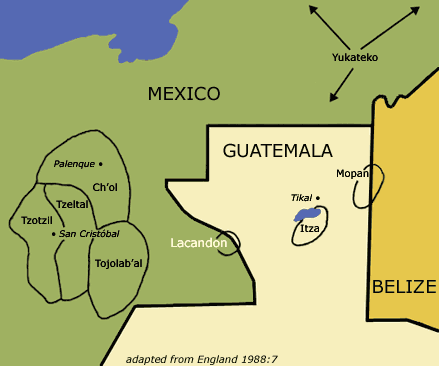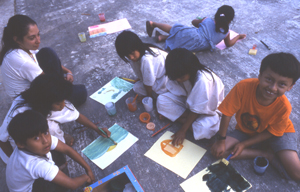Urgency
According to the late Chan K’in viejo, the Lacandones’ last traditional civic and religious leader, the end of the world is nigh –2008 to be exact. Even though he believes a new world will be created from the ashes of the old, he says that this time the Lacandones will not be part of it. While this may sound like an old man’s lament, several changes are taking place that would validate this prophesy.
Deforestation
Unbridled deforestation has destroyed more than 50% of the forest in less than five decades (Miranda 1952; Muench 1982; Rzedowski 1978). Not only have species been eradicated and habitats destroyed, but much of the traditional Lacandon knowledge has become irrelevant and the cultural contexts for learning and disseminating it have thus been abandoned.
One particularly alarming consequence is the replacement of the Lacandones’ remarkably productive system of swidden agriculture with methods that destroy soil fertility (Levy and Golicher 2004:497). These methods consisted of multicropping, rotating fields for cultivation, and letting their fields lay fallow for long periods between cultivation.Today, they have reduced the varieties of crops to corn, beans and squash, and shortened the fallow period. This has led to the reduction of the quantity and quality of mature secondary forest available for agriculture (Nigh & Levy n.d.: 6). And not only are the Lacandones losing their forest. The abandonment of traditonal Lacandon farming also presages the loss of an entire cultural complex that has its basis in Lacandon myths of creation and destruction in which the episodes correspond to stages in the swidden cycle (McGee 1997:189). Conceivably, when the real-life cycle becomes irrelevant so too will the corresponding myth, since it will no longer have a basis in reality, and traditional wisdom will soon dwindle away along with the language used to convey it. In an effort to avert further loss of traditional ecological knowledge, Cook has begun the Lacandon eco-literacy project. Click on the link to the Lacandon EcoLiteracy page to read about the project and see how you can help.
Colonization

Despite conservation efforts the destruction continues, as the burgeoning colonization in the forest is expanding the population to the extreme. In 1960, the total population in the forest was at 60,000. By 1995, it had grown to 350,000. By 2000, it had increased to 603,000. It is predicted that, by 2010, the population in the Selva Lacandona will have reached a population of 787,000 (O'Brien 1998:18; Sanchez 2001, cited in Nations 2006:141).
 Western
Influences
Western
Influences
Other areas of traditional life are also disintegrating. Lacandon forms of traditional devotion religion have all but been abandoned, in particular, the traditional balche ceremony, a central ritual in Lacandon religion (McGee 1987:108). What has been lost is not only the ritual but the songs, chants, and ritual formulae, which displayed the semantic couplet structure characteristic of Classic Maya literature and the metaphorical symbolism of pre-Hispanic Maya.
Story-telling has also come to an end. In oral societies, story-telling serves to instruct and entertain, and in Lacandon society, story-telling was typically the job of the patriarch. Since no one succeeded Chan K'in, the Lacandones' ritual and spiritual leader, this practice has stopped. Instruction is now handled by a state-run primary school, which teaches children about the world and everything Mexican in a language (Spanish) that is not their own.
Television has made its way into the village. Nearly every Lacandon household owns a satellite dish, which funnels in over 60 channels of Spanish and English programming. Apart from contibuting to the loss of traditional stories and folk knowledge, television has undoubtedly accelerated changes in the Lacandon diet, fueled an appetite for brand name products (e.g., Cup o' Noodles, Nivea baby products) and material wealth.
Together, the loss of traditional wisdom and the pressures to compete in a modern society are reducing the Lacandones to icons of a bygone era. If this trend continues, the Lacandones will cease to be hach winik 'True People' and the traditions that made them unique will be gone.
| University of Victoria | Department of Linguistics | Lacandon Cultural Heritage |Urgency |

|